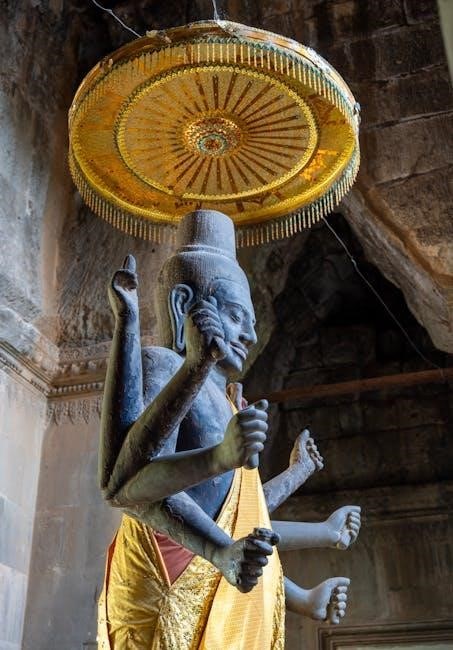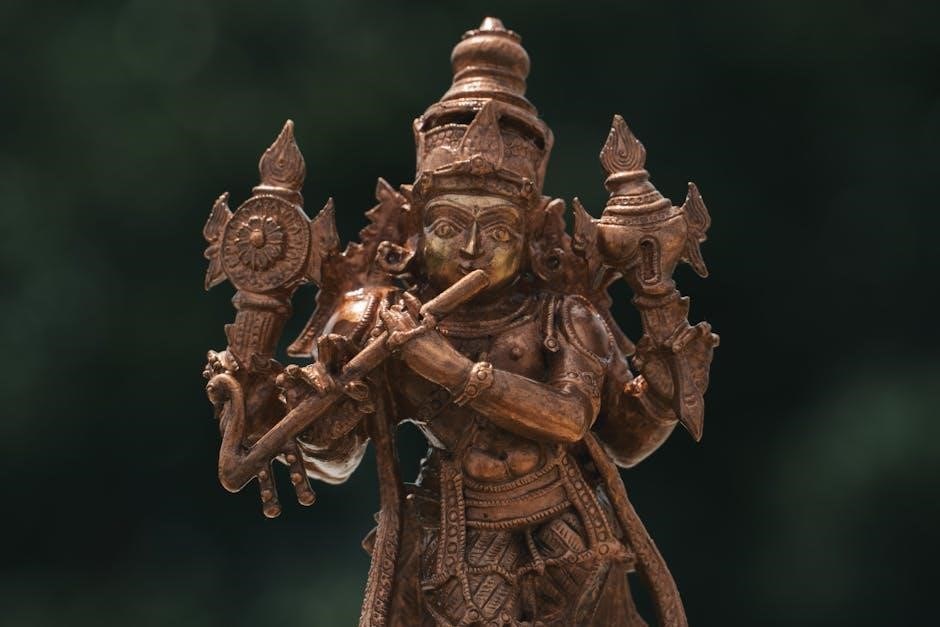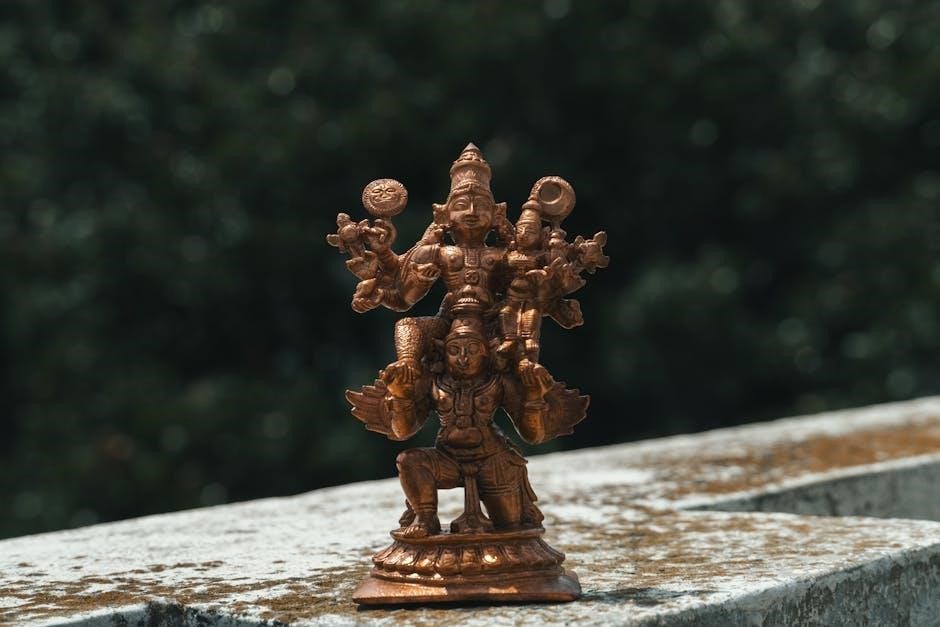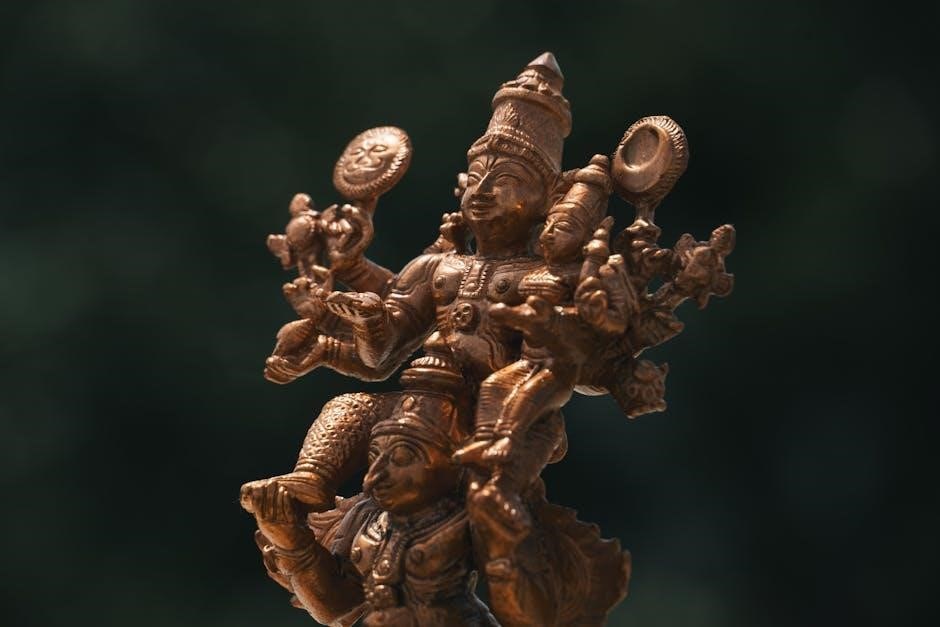vishnu ashtothram telugu pdf
Vishnu Ashtothram is a revered Vedic hymn dedicated to Lord Vishnu, comprising 108 divine names․ It holds significant spiritual importance in Hinduism, offering devotion, peace, and divine connection․ Available as a Telugu PDF, it is widely cherished in Telugu-speaking communities for its sacred chants and profound meaning․
1․1 Overview of Vishnu Ashtothram
Vishnu Ashtothram is a sacred Hindu devotional prayer consisting of 108 divine names of Lord Vishnu․ It is a powerful Vedic hymn that extols the virtues and attributes of Lord Vishnu, the protector of the universe․ The Telugu PDF version of this prayer is widely popular among devotees, offering a convenient way to chant and reflect on the sacred names․ Available on platforms like Stotranidhi․com, it is a valuable resource for spiritual seekers, providing a deeper connection to Lord Vishnu and fostering peace, prosperity, and divine grace in life․
1․2 Significance of Lord Vishnu in Hinduism
Lord Vishnu is one of the most revered deities in Hinduism, part of the Trimurti alongside Brahma and Shiva․ As the preserver of the universe, he embodies balance and harmony, ensuring cosmic order․ His divine avatars and timeless wisdom inspire devotion and trust among followers․ The Vishnu Ashtothram Telugu PDF reflects this reverence, offering a medium to connect with his divine attributes through sacred chants․ His significance extends beyond rituals, influencing daily life with teachings of compassion, justice, and spiritual growth, making him a central figure in Hindu devotion and culture․
1․3 Importance of Ashtothram in Devotional Practices
Ashtothram holds a central place in Hindu devotional practices, serving as a powerful medium for worship and spiritual connection․ The recitation of the 108 names of Lord Vishnu fosters deep devotion, emotional solace, and a sense of unity with the divine․ It is believed to purify the mind, bestow blessings, and offer protection from life’s challenges․ Regular chanting of Vishnu Ashtothram is considered a pathway to spiritual growth, fostering inner peace and a stronger bond with Lord Vishnu․ Its availability in Telugu PDF has made it accessible for devotees to practice and connect with its sacred essence effortlessly․

Structure and Content of Vishnu Ashtothram
Vishnu Ashtothram consists of 108 divine names of Lord Vishnu, each carrying profound spiritual significance․ Structured as a sacred list, it is revered in Telugu-speaking communities and available as a convenient PDF․
2․1 The 108 Names of Lord Vishnu
The 108 names of Lord Vishnu in Vishnu Ashtothram reflect His divine attributes and roles․ Each name, such as Vishnave, Lakshmipate, and Jaganatha, embodies distinct virtues and powers․ These names are deeply revered in Hindu scripture, offering insights into Vishnu’s protective and nurturing nature․ The Telugu PDF version beautifully presents these names, making them accessible for chanting and reflection․ Devotees find solace in reciting these names, seeking blessings and spiritual growth․ The structure of the Ashtothram, with its rhythmic and meaningful names, enhances devotional practices and connects believers to the divine essence of Lord Vishnu․
2;2 Meaning and Interpretation of Each Name
Each of the 108 names in Vishnu Ashtothram carries profound spiritual significance, reflecting Lord Vishnu’s divine attributes and roles․ Names like Vishnave and Lakshmipate symbolize His divine presence and lordship over prosperity․ The Telugu PDF version provides insights into these meanings, highlighting Vishnu’s protective nature, cosmic forms, and benevolence․ Each name is a meditation on His virtues, offering devotees a deeper connection to His divine essence․ This interpretative richness enhances the devotional experience, making the Ashtothram a powerful tool for spiritual growth and worship․
2․3 Linguistic and Cultural Significance of Telugu Version
The Telugu version of Vishnu Ashtothram holds immense cultural and linguistic significance, preserving ancient traditions while making the sacred hymn accessible to Telugu-speaking devotees․ The Telugu script’s poetic elegance enhances the spiritual experience, fostering a deep emotional connection․ This version is widely cherished in Andhra Pradesh and Telangana, where it is integral to temple and home worship․ Its translation from Sanskrit ensures that the divine essence remains intact, allowing devotees to connect with Lord Vishnu’s virtues in their mother tongue․ This cultural adaptation strengthens community bonds and spiritual practices, making it a beloved part of regional heritage․

Benefits of Chanting Vishnu Ashtothram
Chanting Vishnu Ashtothram offers spiritual growth, emotional solace, and remedial benefits․ It enhances devotional focus, grants inner peace, and strengthens faith in Lord Vishnu․
3․1 Spiritual and Emotional Benefits
Chanting Vishnu Ashtothram brings profound spiritual and emotional benefits․ It fosters inner peace, calms the mind, and strengthens faith in Lord Vishnu․ The divine names evoke a deep sense of devotion, helping devotees connect with the divine․ Regular chanting is believed to reduce stress, promote emotional stability, and grant solace during challenging times․ It also enhances self-reflection and spiritual growth, fostering a sense of harmony and balance in life․ The hymn’s rhythmic recitation creates a meditative atmosphere, uplifting the soul and nurturing emotional well-being․ Many devotees attest to its transformative power in their lives․
3․2 Remedial Benefits for Life’s Challenges
Chanting Vishnu Ashtothram is believed to offer remedial benefits for various life challenges․ Devotees seek solace in its divine verses to overcome obstacles such as health issues, financial struggles, and relationship problems․ The hymn’s sacred vibrations are thought to ward off negative energies and attract positive fortune․ Many followers believe that reciting the 108 names of Lord Vishnu helps mitigate karmic difficulties, bringing relief and prosperity․ It is often recommended as a spiritual remedy to restore balance and harmony in life, providing hope and resilience during adversity․ Regular chanting is seen as a powerful tool for resolving life’s challenges․
3․3 Enhancing Devotional Focus and Peace
Chanting Vishnu Ashtothram helps devotees attain a deeper state of devotional focus and inner peace․ The rhythmic recitation of Lord Vishnu’s 108 names creates a meditative atmosphere, calming the mind and soothing the soul․ By immersing oneself in the divine verses, one can connect with the spiritual essence of Lord Vishnu, fostering a sense of tranquility and mental clarity․ Regular chanting enhances concentration during worship and brings a profound sense of harmony, making it an effective practice for those seeking inner balance and peace in their daily lives․

How to Download Vishnu Ashtothram in Telugu PDF
Visit trusted spiritual websites like Stotranidhi․com or Mystic Guide․ Search for “Vishnu Ashtothram Telugu PDF” and follow the download link․ Ensure the source is reliable for an authentic version․
4․1 Reliable Sources for Download
Stotranidhi․com is a trusted platform offering the Vishnu Ashtothram Telugu PDF for free․ Mystic Guide provides an easy-to-download version with additional chanting guides․ Scribd and other document-sharing sites also host this sacred text, ensuring accessibility․ These sources are verified for authenticity and quality, making them ideal for devotees seeking a genuine version of the Vishnu Ashtothram․ Downloading from these sites ensures you receive the complete and accurate 108 names of Lord Vishnu in Telugu script, perfect for daily chanting and spiritual practices․
4․2 Step-by-Step Guide for Free Download
To download the Vishnu Ashtothram Telugu PDF for free, visit a reliable site like Stotranidhi․com․ Navigate to the “Telugu eBooks” section and search for “Vishnu Ashtothram․” Click on the download link provided, then follow the on-screen instructions to complete the download․ Ensure the source is verified for authenticity to avoid malicious files․ Once downloaded, the PDF is ready for use in spiritual practices․ This guide ensures a smooth and safe downloading process, making the sacred text accessible for devotees worldwide․
4․3 Tips for Effective Utilization of the PDF
For effective utilization of the Vishnu Ashtothram Telugu PDF, ensure the text is readable by zooming in on your device․ Use bookmarks or tabs to navigate easily between sections․ Highlight or underline key verses for quick reference during chanting․ Print the PDF for a physical copy or save it to a dedicated folder for digital organization․ Share the PDF with fellow devotees to spread its spiritual benefits․ Regularly review and reflect on the meanings to deepen your understanding․ Consider adding personal notes or insights for a more meaningful practice․ This approach enhances both convenience and spiritual connection․

Key Websites Offering Vishnu Ashtothram Telugu PDF
Stotranidhi․com, Mystic Guide, and Scribd are reliable platforms to download the Vishnu Ashtothram Telugu PDF․ These sites provide easy access to the sacred text for devotees worldwide․
5․1 Stotranidhi․com
Stotranidhi․com is a trusted platform offering the Vishnu Ashtothram Telugu PDF for free download․ Updated on July 11, 2024, it provides a 3-page document with sacred chants․ The site is known for its extensive collection of devotional content, including stotras in Telugu, Kannada, Tamil, and English․ Devotees can easily access and download the PDF, making it a popular choice for spiritual seekers․ Its user-friendly interface ensures a seamless experience for those seeking divine chants and scriptures․
5․2 Mystic Guide and Other Spiritual Platforms
Mystic Guide is a prominent platform offering the Vishnu Ashtothram Telugu PDF for free download․ It provides easy access to divine chants, lyrics, and their meanings, catering to both devotees and spiritual seekers․ Alongside Mystic Guide, other spiritual platforms like Scribd and document-sharing sites host this sacred text, ensuring widespread accessibility; These platforms often feature additional resources, such as chanting guides and interpretations, enriching the devotional experience․ Their user-friendly interfaces and diverse offerings make them invaluable for those seeking spiritual growth and connection to Lord Vishnu’s teachings․
5․3 Scribd and Other Document-Sharing Sites
Scribd and other document-sharing platforms provide convenient access to the Vishnu Ashtothram Telugu PDF․ These sites offer a wide range of spiritual texts, including devotional chants and scriptures․ Users can easily download or read the PDF online, often for free․ Scribd, in particular, has gained popularity for its extensive collection of religious texts, making it a go-to destination for devotees seeking the Vishnu Ashtothram․ Additionally, other platforms like Stotranidhi․com and similar sites ensure that the sacred text is readily accessible to a global audience, fostering spiritual growth and devotional practices․

Understanding the Telugu Script and Pronunciation
Telugu script is a syllabic writing system used to write the Vishnu Ashtothram․ Each character represents a syllable, making it easier to read and chant․ Proper pronunciation involves understanding accents, intonation, and nasal sounds, essential for accurate recitation․ Resources like pronunciation guides and audio aids are often included with the Telugu PDF to help devotees master the chanting․
6․1 Guide to Reading Telugu Script
Telugu script is a syllabic writing system, where each character represents a syllable․ It consists of 56 symbols, including 16 vowels and 40 consonants․ The script flows from left to right and is known for its rounded shapes․ In the Vishnu Ashtothram Telugu PDF, each name of Lord Vishnu is written in clear Telugu letters, making it easy for devotees to read․ The script includes diacritical marks to indicate pronunciation, such as nasal sounds and accents․ Conjunct consonants are formed by combining two or more consonant letters, which is a unique feature of the Telugu script․ The PDF often includes guides to help readers understand and chant the names accurately․
6․2 Pronunciation Tips for Chanting
Chanting Vishnu Ashtothram in Telugu requires attention to pronunciation for its spiritual efficacy․ The script’s melodic nature is preserved through proper intonation and stress on syllables․ Vowels like “అ” (a) and “ఆ” (ā) must be elongated, while consonants like “క” (ka) and “చ” (cha) require clarity․ Aspirated sounds, such as “ఖ” (kha) and “ఫ” (pha), should be pronounced with a soft breath․ Devotees are advised to practice slowly, listen to audio guides, and focus on maintaining the rhythm․ Accurate pronunciation enhances the devotional experience and connects the chanter to the divine essence of Lord Vishnu․
6․3 Common Mistakes to Avoid
When chanting Vishnu Ashtothram in Telugu, common mistakes include mispronouncing vowels and consonants, rushing through verses, and ignoring stress patterns․ Many mix up similar-sounding names like “Vasudeva” and “Vaikuntha․” Others overlook the significance of pauses between names, disrupting the hymn’s flow․ Additionally, some may skip initial invocations or fail to maintain the correct pitch, diminishing the chant’s spiritual impact․ It is essential to practice meticulously, follow authentic guides, and seek guidance from experienced practitioners to preserve the sanctity and effectiveness of the recitation․

Historical and Scriptural Context
Vishnu Ashtothram originates from the Mahabharata, authored by Vyasa, and is deeply rooted in Hindu scriptures․ It reflects ancient Vedic traditions and remains a cornerstone of devotional practices, emphasizing Lord Vishnu’s divine attributes․
7․1 Origin of Vishnu Ashtothram
Vishnu Ashtothram traces its origin to the ancient Vedic period, deeply embedded in Hindu scriptures like the Mahabharata․ Authored by the revered sage Vyasa, it is part of the broader tradition of enumerating Lord Vishnu’s divine names․ The hymn’s structure and content reflect the rich spiritual heritage of Hinduism, emphasizing devotion and the glorification of Lord Vishnu’s divine attributes․ Over centuries, it has evolved into a cornerstone of devotional practices, resonating with followers seeking spiritual enlightenment and connection with the divine․ Its enduring significance underscores its role in daily worship and rituals, offering solace and guidance to believers․
7․2 References in Ancient Scriptures
Vishnu Ashtothram is deeply rooted in ancient Hindu scriptures, including the Mahabharata and Puranas․ The Mahabharata, composed by Vyasa, contains references to the 108 names of Lord Vishnu, which form the core of this hymn․ The Padma Purana and other sacred texts also highlight its significance, emphasizing the divine attributes of Lord Vishnu․ These references underscore the hymn’s spiritual authenticity and its role in devotional practices․ The scriptural validation of Vishnu Ashtothram reinforces its importance in Hindu worship, making it a cherished text for spiritual growth and divine connection․
7․3 Vyasa and the Mahabharata Connection
Vyasa, the revered sage and author of the Mahabharata, is traditionally credited with composing the Vishnu Ashtothram․ This sacred hymn is deeply connected to the Mahabharata, where Lord Vishnu’s divine attributes and avatars are glorified․ The 108 names in the Ashtothram reflect the descriptions of Vishnu found in the epic, emphasizing his role as the protector and preserver of the universe․ Vyasa’s composition highlights the profound devotion to Vishnu, making the Ashtothram a cornerstone of Hindu spirituality and worship․ This connection to the Mahabharata underscores its scriptural authenticity and enduring significance․

Cultural and Regional Significance
Vishnu Ashtothram holds immense cultural importance in Telugu-speaking regions, being integral to temple and home worship․ It is often recited during festivals, reflecting deep-rooted devotion and heritage․
8․1 Popularity in Telugu-Speaking Communities
Vishnu Ashtothram is deeply revered in Telugu-speaking communities, where it is widely chanted for its spiritual and emotional benefits․ The Telugu PDF version is easily accessible, making it a cherished resource for devotees․ Its popularity stems from its sacred status as a devotional hymn, fostering a strong cultural and emotional connection․ Many Telugu-speaking families include it in daily prayers, while temples and community gatherings often feature its recitation․ This widespread acceptance highlights its enduring significance in preserving cultural identity and spiritual traditions․
8․2 Role in Temple and Home Worship
Vishnu Ashtothram plays a vital role in both temple and home worship, serving as a cornerstone of devotional practices․ In temples, it is often recited during pujas and special rituals, creating a sacred ambiance for devotees․ At home, families incorporate it into daily prayers or during auspicious occasions, seeking divine blessings․ The Telugu PDF version has made it accessible for individuals to chant along with proper pronunciation and meaning, fostering a deeper connection with Lord Vishnu․ Its inclusion in worship rituals strengthens spiritual practices and reinforces faith in the divine․
8․3 Festivals and Special Occasions
Vishnu Ashtothram is integral to Hindu festivals and special occasions, enhancing their spiritual significance․ During events like Vaikunta Ekadashi, Krishna Janmashtami, and Rama Navami, devotees chant the hymn to invoke Lord Vishnu’s blessings․ The Telugu PDF version is widely used in these celebrations, providing easy access to the sacred text․ Families and communities recite it collectively, fostering unity and devotion․ Its recitation during these occasions is believed to bring prosperity, peace, and divine grace, making it a cherished part of festival rituals and spiritual observances in Telugu-speaking regions․

Vishnu Ashtothram and Its Impact on Devotees
Vishnu Ashtothram deeply impacts devotees, fostering spiritual growth and inner peace․ Chanting the hymn strengthens faith, enhances devotion, and provides solace during life’s challenges, resonating deeply in the hearts of believers․
9․1 Personal Experiences and Testimonials
Devotees often share heartfelt experiences of how Vishnu Ashtothram has transformed their lives․ Many testify to its power in resolving problems, bringing peace, and fostering a deeper connection with Lord Vishnu․ Several individuals mention that chanting the hymn regularly has helped them navigate life’s challenges with strength and positivity; Others highlight the emotional solace it provides during difficult times․ The shared stories and testimonials underscore the hymn’s ability to inspire faith and devotion․ These personal accounts, widely available online and in spiritual communities, illustrate the profound impact of Vishnu Ashtothram on its practitioners․
9․2 Role in Spiritual Growth and Enlightenment
Vishnu Ashtothram plays a pivotal role in fostering spiritual growth and enlightenment by deepening devotion and focus․ The 108 names of Lord Vishnu, each imbued with profound meaning, guide seekers toward self-realization and divine connection․ Chanting the hymn is believed to purify the mind, cultivate virtue, and illuminate the path to spiritual awakening․ The Telugu PDF version enhances accessibility, allowing devotees to integrate this sacred practice into their daily routines, thereby nurturing a deeper sense of spirituality and enlightenment․ Its rhythmic recitation is particularly revered for its transformative power in elevating consciousness and fostering inner peace․
9․3 Community and Social Impact
Vishnu Ashtothram fosters a sense of unity and shared devotion within communities, particularly in Telugu-speaking regions․ Its widespread availability as a Telugu PDF has made it accessible to millions, strengthening cultural and spiritual bonds․ Group chanting in temples and festivals promotes collective worship and harmony․ The hymn’s emphasis on virtues like compassion and truthfulness contributes to moral upliftment in society․ By preserving ancient traditions, it plays a vital role in maintaining cultural heritage․ Its influence extends beyond individual devotion, creating a ripple effect that enhances social cohesion and spiritual well-being in communities, making it a cornerstone of collective spiritual growth and societal transformation․

Related Stotras and Prayers
Vishnu Ashtothram is complemented by other sacred hymns like Vishnu Sahasranamam and various Ashtothrams, enriching devotional practices and deepening spiritual connection with Lord Vishnu․
10․1 Other Ashtothrams and Stotras
Besides Vishnu Ashtothram, other prominent Ashtothrams include those dedicated to deities like Ganesha, Shiva, and Durga․ These hymns, also comprising 108 names, share similar devotional significance․ Additionally, Stotras like the Lakshmi Stotram and Narayana Stotram enrich spiritual practices․ These texts, often available in Telugu PDF, provide diverse ways to connect with the divine, fostering devotion and spiritual growth․ They complement the Vishnu Ashtothram by offering varied perspectives on worship and divine attributes․
10․2 Vishnu Sahasranamam
Vishnu Sahasranamam, a sacred hymn from the Mahabharata, is a revered devotional text in Hinduism․ It consists of 1000 names of Lord Vishnu, each highlighting His divine attributes and cosmic roles․ Often chanted for spiritual growth, it is considered a powerful tool for self-realization and devotion․ Available in Telugu PDF, it complements the Vishnu Ashtothram by offering deeper insights into Vishnu’s nature․ This text is integral to worship, providing a comprehensive understanding of His universal form and divine grace, making it a cherished companion for devotees seeking spiritual enlightenment․
10․3 Other Devotional Literature
Beyond Vishnu Ashtothram, other devotional texts like Lalita Sahasranamam, Shiva Sahasranamam, and Bhakti literature enrich spiritual practices․ These works, often available in Telugu PDF, provide profound insights into Hindu philosophy and devotion․ The Bhagavad Gita and Ramayana are also integral, offering moral and spiritual guidance․ Together, these scriptures and hymns create a comprehensive library for worship and self-reflection, helping devotees deepen their connection with the divine and fostering a life of righteousness and inner peace․
Vishnu Ashtothram, a sacred Vedic hymn, offers a divine connection, fostering spiritual growth and peace․ Regular chanting enhances devotion, providing solace and blessings․ Embrace its power through the Telugu PDF․
11․1 Final Thoughts on Vishnu Ashtothram
Vishnu Ashtothram is a timeless devotional treasure, offering a profound connection to Lord Vishnu․ Its 108 names encapsulate divine attributes, providing solace, peace, and spiritual growth․ The Telugu PDF version makes it accessible for devotees to chant and reflect on its sacred meaning․ Regular recitation strengthens faith, fosters inner calm, and aligns one with the divine․ Embrace this sacred text, available for free download, and integrate its blessings into daily life, deepening your devotion and seeking Lord Vishnu’s grace․
11․2 Encouragement for Regular Chanting
Embrace the divine practice of chanting Vishnu Ashtothram regularly․ This sacred hymn, available as a Telugu PDF, offers profound spiritual benefits, fostering inner peace and devotion․ By chanting its 108 names, devotees connect deeply with Lord Vishnu, seeking His blessings and guidance․ Regular recitation strengthens faith, enhances mental clarity, and brings harmony to life․ Make it a daily ritual to experience its transformative power and align with the divine energy of Lord Vishnu, ultimately leading to spiritual growth and enlightenment․
11․3 Blessings of Lord Vishnu
Chanting Vishnu Ashtothram invokes the divine blessings of Lord Vishnu, offering peace, protection, and prosperity․ His grace alleviates life’s challenges, granting wisdom and happiness․ Devotees who recite the 108 names with devotion experience spiritual growth and divine connection․ Lord Vishnu’s blessings embody compassion, strength, and eternal guidance, inspiring believers to lead virtuous lives and attain inner harmony․ Embrace His divine mercy through regular chanting, seeking solace in His infinite love and wisdom․
